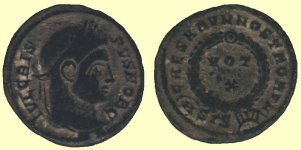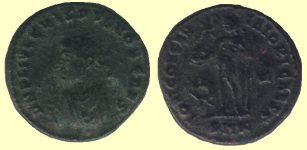
Crispus Caesar 317 - 326 A.D.
By clicking on the pictures you'll be linked to a more complete description of the coin. At the bottom of this page there is a more elaborate biography of the emperor.
 |
Obverse: IVL CRISPVS NOB CAES |
| Reverse: CAESARVM NOSTRORVM (VOT X) | |
|
Fieldmarks: -
|
|
| Exergue: ASIS |
 |
Obverse: DN FL IVL CRISPVS NOB CAES |
| Reverse: IOVI CONSERVATORI CAESS | |
|
Fieldmarks: Wreath in the left field, mark in rightfield
unreadable
|
|
| Exergue: SMK |
Crispus (Caesar) 317 - 326 A.D.
Flavius Iulius Crispus was born somewhere around 305 AD and was the eldest son of Constantine I and his concubine Minervina. In 307 Constantine married Fausta, whether Minerva died or was just put aside is not known. Crispus was educated by the Christian scholar Lactantius thereby giving a clear sign of Constantine's commitment to Christianity. On the 1st of march 317, at Serdica, Crispus was appointed Caesar by his father together with his baby half-brother Constantine II. This was part of an agreement between Constantine and Licinius (Constantine 's co-ruler at the time), who simultaneously promoted his own son, Licinius the Younger, to the same position. Crispus was consul three times in 318, 321, and 324 and was appointed governor of Gaul in the year 320. In January of 322 Crispus married a woman named Helena who bore him a child in October of 322. While nominally in charge of Gaul, with a prefect at his side, he successfully undertook military operations against the Franks and Alamanni in 320 and 323. In 324, during the second war between Constantine and Licinius, he excelled as commander of Constantine's fleet in the waters of the Hellespont, the Propontis, and the Bosporus. With his lighter and faster ships, he smashed the fleet of Licinius' admiral Abantus in a two day battle in the Hellespont. This victory was decisive in Constantine's final victory over his fellow Augustus Licinius. Crispus had quite a brilliant military career and was apparently quite popular with the people and his inheritance of the throne seemed quite certain.
Crispus' end however was quite tragic, his own father ordered him to be put to death at Pola in Istria in 326 AD for treason. It seems that Constantine’s wife Fausta accused Crispus of having an affair with her and of plotting to overthrow Constantine and seizing the throne. Later, it was discovered that Fausta had been lying. It is quite likely that she simply wanted Crispus out of the way so that her three sons Constantine II, Constantius II, and Constans would have no trouble inheriting the throne. Upon hearing of Fausta's duplicity and treachery, Constantine had her murdered in her bath. She was locked in and the temperature of the water was gradually raised so that she either suffocated due to the heat and steam or was actually boiled alive. History has not recorded the fate of Crispus' wife and his child (or children).
For this biography I've used the texts from the following websites:
http://www.imperiumromanum.com/
http://www.roman-emperors.org/
http://www.roman-empire.net/
And from: Gibbon's Decline and fall of the Roman empire.